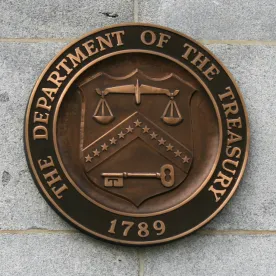On Jan. 1, 2021, Congress enacted, over President Trump’s veto, the National Defense Authorization Act, a 4500-page behemoth that in its midst contained the Anti-Money Laundering Act of 2020 (“AMLA”). I attempted to give some overview of this legislation in my Jan. 12, 2021 Blog “In Defense of the Realm: The NDAA, Money Laundering and Terrorist Financing.” Responsibility for implementing the AMLA falls on a special unit of the U.S. Department of the Treasury, the Financial Crimes Enforcement Network, or FinCEN. One of the provisions in AMLA authorizes FinCEN to set up a pilot program to allow financial institutions operating in the United States, even if owned by non-U.S. institutions (except for those in certain excluded areas, such as Russia and China and other jurisdictions subject to U.S. sanctions or as determined by the Secretary of the Treasury), to share information about suspicious activities more freely with their foreign affiliates.
Until AMLA, U.S. financial institutions were not permitted to disclose the contents of Suspicious Activity Reports (“SAR”) filed with FinCEN and other law enforcement authorities, except that foreign-owned institutions with U.S. operations (a subsidiary, branch, or affiliate) were allowed to share a SAR with its head office or controlling company, as well as certain domestic-U.S. affiliates subject to the same SARs reporting restrictions. So, for example, a New York subsidiary of a Spanish bank could share SARs information with its Spanish headquarters or with other U.S. affiliates of the New York subsidiary. But no information in a SAR, or even the existence of a SAR itself, could be shared with a sibling institution in Singapore or Brazil; only the Spanish bank headquarters could pass that information to the affiliates where the actors might be engaged in financial transactions.
Pilot Program for Foreign Bank Affiliates
On Jan. 24, 2022, FinCEN issued a Notice of Proposed Rulemaking seeking comment on a pilot program that would allow U.S. financial institutions owned by foreign companies to share SARs information with foreign affiliates in order to enhance the anti-money laundering. The proposed pilot program is to run through Jan. 1, 2024, and might be extended for two years. The comment period ends on Monday, March 28, 2022. Financial institutions may participate in the pilot program only if they apply and are accepted.
The application process includes a filing with FinCEN, which must (among other items): i) list the applicant’s non-U.S. branches, subsidiaries, and affiliates (including the jurisdiction of the entity) with which the applicant may share SARs (both the existence of the SAR and its underlying information); ii) the purposes for which those non-U.S. entities would use the SAR information; and iii) a description of all internal controls of the applicant (and of the entities with which it may share SARs) that are in place to prevent unauthorized disclosures of SARs.
Once accepted, pilot program participants must file quarterly reports with FinCEN that detail: i) the number of SARs shared; ii) the name, jurisdiction, relationship with the participant of each entity that received a shared SAR, and the purpose and use of the sharing; iii) legal and compliance issues that arise; iv) any technical difficulties experienced; v) enhancements to the participant’s anti-money laundering (“AML”) program gleaned from participating in the pilot program; and vi) any shortcomings identified in the participant’s AML program.
SARs Pilot Program Participants
Pilot program participants are also required to have sufficient policies, procedures, and internal controls both for themselves and for their respective affiliated non-U.S. entities to protect against unauthorized disclosure of SAR information, including: i) confidentiality agreements with all personnel in the foreign affiliates with access to SAR information to safeguard that information; ii) systems to securely transmit and store SAR information; and iii) processes for participant’s U.S. personnel to review requests from foreign law enforcement, regulators, or other persons for SAR information, and immediately to notify FinCEN of the requests.
The pilot program as proposed allows FinCEN to terminate the participation of a participant at any time for a variety of reasons, including geo-political developments, internal control deficiencies, or issues suggesting that the participant and/or its non-US affiliates are unable adequately to safeguard SARs information. Hence, a financial institution thinking about participating will want to complete a thorough internal audit of its AML program and those of its non-U.S. affiliates, ideally before applying. The tasks will be easier for those financial institutions that already share SARs with their non-U.S. head offices.
AMLA expresses the hope that expanded SAR sharing will enhance AML oversight and compliance, not least because a relevant SAR can be shared directly with a foreign affiliate without having to pass through the bureaucracy of a corporate headquarters. On the other hand, participation in the pilot program will certainly involve costs for AML oversight and pilot program reporting. It may also increase regulatory scrutiny and enforcement, including enforcement for failure to meet the requirements of the pilot program.



 />i
/>i

